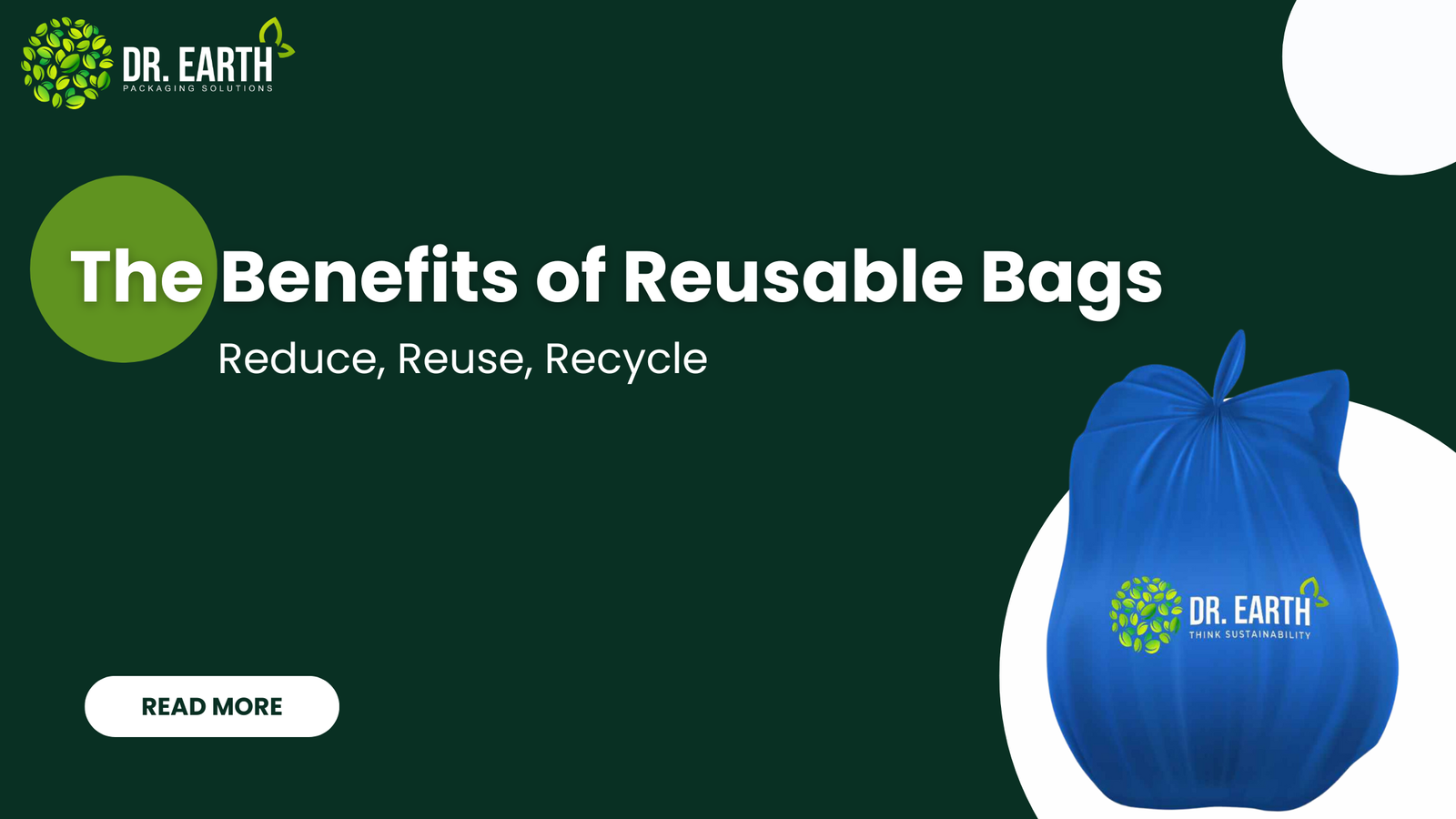
Pollution by plastics is among the most severe problems concerning the ecosystem of the Earth. Each year, millions of tons of plastic are chucked into the sea, in dumpsites, and other natural environments with an adverse impact on species and geography. Even more effective is the concept of waste reduction, which in essence means the avoidance of waste in the first place. This is where reusable bags fit in—be it a tool that is as basic as it gets but can go a long way in preventing the use of plastic bags and advocating for change.
As a company at Dr. Earth, we fully support the initiatives of going green and thus sell products like biodegradable bags and compostable bags, which are better than using single-use plastics. Of course, there’s more to reusable bags and this blog discusses the importance and value of the “Reduce, Reuse, Recycle” mantra.
The Environmental Impact of Single-Use Plastic Bags
Single-use plastic bags are in just about every store—easy, cheap and regretfully, here today gone tomorrow. These bags, as the convention suggests, are use for a few minutes and then disposed of, but it will be hundreds of years before they decompose. In this long process of decomposition, they disintegrate into small, dangerous pellets referred to as microplastics, which pollute our water, soil and food chain.
They are smaller than 5 mm in size and are dangerous because they can affect the lives of other sea creatures and even become part of the food chain, affecting the health of humans. Also, the manufacture of plastic bags requires a lot of fossil fuels, hence the emissions, which are detrimental to the climate.
This is a treat because using the reusable bags has the potential to counteract these effects that have been deeme dangerous. As compared to disposable bags, which are widely use today, reusable bags—especially those made of biodegradable or compostable materials present a more acceptable practice that not only helps in the decrease of waste, which impairs the sustainability of earth’s resources, but also offers protection to the planet.
Understanding Reusable Bags: Types and Benefits
There are several types of natural materials that can be use as building materials and they have the following benefits:
1. Biodegradable Bags:
These bags are called biodegradable because they use natural materials that degrade easily and pose less threat than ordinary polythene bags.
4oSuch bags break down naturally without relying on processes like ultraviolet light, oxygen, or water.Biodegradable bags therefore do not contribute to the general increase of landfill waste and also do not allow dangerous substances to leech back into the environment.
2. Compostable bags:
Compostable bags can be defined as those that are capable of being degrade into water, carbon dioxide and biomass in a compost facility. Unlike normal poly bags that produce microplastics and further residues, compostable bags biodegrade and do not harm the environment in any way. These bags are best suite for the people who do composting at their homes or wish to contribute to the zero-waste community.
Purchasing biodegradable and compostable bags can make a huge difference and bring a change in the world by relieving the environmental problems that the use of plastic bags causes.
The Benefits of Reusable Bags
1. Reduce Waste:
The most concerning benefit would be a reduction in the usage of waste. Each biodegradable bag or compostable bag that is use means thousands of single-use plastic bags that could have been thrown to the dumps or wash to the sea. Through this transition, the consumers bear the responsibility of eliminating waste production and thus reducing plastic pollution.
2. Save Money:
Even though reusable bags might be a little expensive as compare to single-use plastic bags, however, their usage is cheaper in the long run. Some stores now give customers an option to be charge for every plastic bag they use; thus, carrying biodegradable or compostable bags will save you lots of money in the long run. Further, some shops provide extra incentive to the customers either in terms of price or by providing bags to take home their purchases, DPIs their saving.
3. Promote sustainability:
The adoption of reusable bags in daily lives is an aspect of sustainable living as much as is possible. Compostable and biodegradable bags are the environmentally friendly bags as they do not produce greenhouse gases since their manufacturing and disposal need fewer raw materials as compared to the normal plastic bags. Furthermore, these bags provide the aspect of sustainability, which means cyclical utilization and recycling of materials in the economy, thus not putting much pressure on the natural resources.
4. Protect Wildlife:
It’s unfortunate that plastic bags pose a severe threat to wildlife, especially aquatic animals. Turtles, fish, and seabirds, for example, mistake plastic for food and often swallow it or get entangled in it.Looking at the experienced deaths of numerous animals, we are to point out that by turning to reusable bags, especially the compostable and biodegradable ones, people can save millions of lives from the plastic death.
5. Encourage responsible consumption:
This way, through using reusable bags, the consumers are able to be conscious of the products they buy and the effect this will have on the environment. If consumers buy bags that are biodegradable and compostable, then they are indicating that they want more environmentally friendly products, and this results in companies changing their policies to meet these demands.
How to Make the Most of Your Reusable Bags
Maximizing the benefits of reusable bags is simple with a few practical tips:
- Choose the Right Bag for the Right Purpose: Choose bags that will meet the various requirements. For instance, general shopping should be done with cloth or canvas bags, food storage should be done with biodegradable bags and other organic waste should be put in compostable bags.
- Care and Maintenance: Make sure you wash your reusable bags so that they do not become dirt and uncleanable. Clean the cloth bags often and also ensure that you pack them well so that they can last as long as possible. Follow the manufacturer’s recommendations for caring for biodegradable and compostable bags to maintain their strength and functionality.
- Always Carry a Bag: It becomes a general practice to always have with you at all times a reusable bag. They are portable and fit easily in the car, purse, or backpack, allowing for quick shopping at any time.
The role of consumers in promoting a plastic-free Future
Free consumers have all the power to create a change on the planet by engaging and making the right decisions. By choosing to shop using biodegradable bags and compostable bags, more of these products are demand in the market, hence actualizing the call for environmentally friendly products. Each time one opts for a reusable bag instead of a carry-out plastic bag, then this means we are saving our environment, wildlife and resources.
The use of biodegradable and compostable bags allows consumers to be a part of and contribute towards the transformation of a healthy environment. At Dr. Earth, we understand that consumers should have a choice, and that choice ought to be a value to which everyone aspires, which is a world without plastic products. Get on board with this mission by choosing reusable options and supporting the increased use of them in the world.
Conclusion
It is very difficult to counter the effects of single-use plastic bags but the solution is not far from us. When reducing the usage of polyethylene bags and its effect on the environment and when using other bags, it was agree that using reusable bags as a whole will develop a positive and sustainable bag. culture of biodegradable and compostable bags. Carry bags make it easy to support a cause that doesn’t pollute the environment, save money, and protect wildlife.
At Dr. Earth, we strive to maintain the company as the leader in offering eco-friendly products that enhance the living standards of living on Earth. Check out our biodegradable and compostable bags today and let’s work together to eliminate the problem of plastic.
FAQs
Q-1: Are biodegradable bags the same as compostable bags?
Ans: Biodegradable bags deteriorate when exposed to cardinal elements such as ultraviolet light, water and oxygen, while compostable bags disintegrate into harmless substances within the environment of composting.
Q-2: Whether compostable bags can be use on a daily basis?
Ans: Yes, compostable bags are very strong and considered durable bags, which are use for grocery shopping, waste bins and other activities.
Q-3: What is the proper way to compostable bags?
Ans: To ensure that compostable bags are dispose of correctly and safely, they must be dump in composting facilities or home compost bins.
Q-4: Are the reusable bags able to eliminate all instances of use of plastic bags in my everyday life?
Ans: Yes, by using cloth, biodegradable or compostable bags, one is in a position to do away with single use of the plastic bags.
Share:
Related Posts

Best Compostable Bags for Grocery Stores in India: A Sustainable Shift for a Cleaner Future
Read More »Send Us A Message
Related Posts













